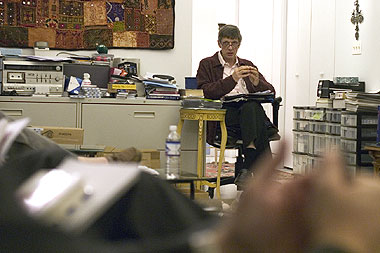
“I recommend it to
everyone who writes.”
LINDA LAEL MILLER
author of eight NY Times bestsellers |
|
“The best there is.”
MICHAEL HARVEY
Emmy winner, Academy Award nominee for Best Screenplay |


|

|
The Crucial Difference

LIFEBLOOD OF EVERY STORY — AND EVERY WRITER
All right, let's stop here. The story's not over yet. It can go in many directions. Each writer will do it his or her own way. But no matter which way it goes it must fulfill the basic story requirements or it will fail.
For now, the question is: what's the difference between this last version and the first? Can you see it? It's not details. It's not dialogue. It's not emotion. I left it out when I raised this question earlier so you could experience it first. The first version — happy, happy, happy — left us cold. The last — trouble, trouble, trouble — got to us. What does that tell us?
It tells us that you must have conflict to create an engaging, compelling story. Conflict. We all know what conflict is, right? Your wife calls you an insensitive slob. You get run off the expressway on the way to work. Your boss tells you you'd better get your work up to par or you'll be out of a job. Your mother disinherits you.

|
Jerry leads every workshop himself.
Your work is never farmed out to substitute coaches.
|
Well, guess what, none of those is conflict, our kind of conflict — dramatic conflict. Oh, those examples are troubling, disturbing, upsetting, but none of them is what's needed to set a story in motion. They're false conflict. Trying to create a story from false conflict is like dragging a dead horse around a racetrack: You might get to the finish line, but you'll never win a race.
Even though every writing teacher and every writing book will tell you that conflict is the necessary ingredient, it remains the single, most misunderstood, most deceptive part of all storytelling. It's the reason why writers write as many duds as hits and why there are so many feeble stories limping around.
Conflict is deceptive because: All conflict is trouble but all trouble is not conflict. What we think of as conflict in everyday experience — disagreements, arguments, insults, shouting matches, even fistfights — are not dramatic conflict. They can be turned into dramatic conflict — anything can, once you know how — but dramatic conflict is a different creature entirely. Dramatic conflict is made up of several elements. Get one wrong, and no matter how brilliantly you write, your story will fall flat.
Because it is the source of everything that happens in story, understanding, creating, and using dramatic conflict is at the heart of The Writers' Loft.
Conflict is critical but how your story is presented on the page is also critical. That brings us to our last example.
 Next: EXPERIENCE VS. IDEAS Next: EXPERIENCE VS. IDEAS
|